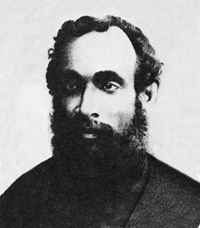6th August 1925 
On 6th August 1925, Surendranath Banerji, one of the founders of modern India, passed away.
What happened?
Surendranath Banerji, one of India’s earliest political leaders during the British Raj, passed away.
Surendranath Banerji Biography
In this article, you can read about the life and contributions of Surendranath Banerji for your IAS exam preparation.
- Born in Kolkata, West Bengal to a Bengali family, Surendranath Banerji was greatly influenced by the liberal and open-minded thinking of his father.
- Surendranath Banerji was also fondly known as Rashtraguru (teacher of the nation).
- Banerji was also the founder of one of India’s first political organizations, the Indian National Association.
- In 1868, Banerji travelled to England to sit for the Indian Civil Service Exam and though he cleared the exam, he was prohibited from joining the services because of a dispute over his correct age.
- In 1871 he cleared the exam and was posted as an assistant magistrate in the Sylhet District (now in Bangladesh).
- In 1875 Banerji became a professor of English at the Metropolitan Institute at Ripon College.
- On 26th July 1876, the Indian National Association, one of India’s first political organizations, was founded by Banerji and Anandmohan Bose.
- Banerji launched action against the issue of age-limit restrictions for Indian students taking the Indian Civil Service Exams through this organization.
- In 1879, Banerji published the newspaper ‘The Bengalee’.
- He was arrested in 1883 for certain controversial statements published in the paper.
- Banerji merged the Indian National Association with the Indian National Congress (founded in 1885 in Bombay), because of their common vision and goals.
- Banerji was elected as Congress President in Pune (1895) and in Ahmedabad (1902).
- Banerji was one of the most prominent and vocal leaders against the partition of Bengal in 1905.
- He did not accept extremist views or the Non-Cooperation Movement of Mahatma Gandhi.
- Banerji was a source of inspiration to other leaders such as Sarojini Naidu and Gopal Krishna Gokhale.
- Banerji played a major role in the Swadeshi Movement.
- He supported the Morley-Minto Reforms (1909) which was criticized by most Indians as being meaningless.
- Gradually, Banerji’s popularity as a moderate Indian politician began to decline.
- The British referred to him as “Surrender Not Banerji”.
- The British knighted him in 1921 for his political support.
- Surendranath Banerji published a substantial work titled “A Nation in Making” for which he is remembered.
- From 1921-1924, Banerji held the position of Minister for Local Self Government.
- He passed away on 6th August 1925 in Barrackpore, West Bengal.
Even today, Surendranath Banerji’s name is celebrated through institutions like the Barrackpore Rastraguru Surendranath College, Surendranath College, Surendranath Evening College and Surendranath College for Women.
Also on This Day ______________________________________________________________________________ 1862: The Madras High Court was inaugurated. 1906: Chitta Ranjan Das and other Congress leaders published the newspaper Vande Mataram. 1945: Atomic bomb dropped on Hiroshima by the US B-29 Superfortress "Enola Gay". 1996: NASA announces that life may have existed on Mars after examining meteorite ALH84001, thought to be from Mars.
Related links:
| Sir Pherozeshah Mehta |
| Sir Rash Behari Ghose |
| Dadabhai Naoroji |
Comments